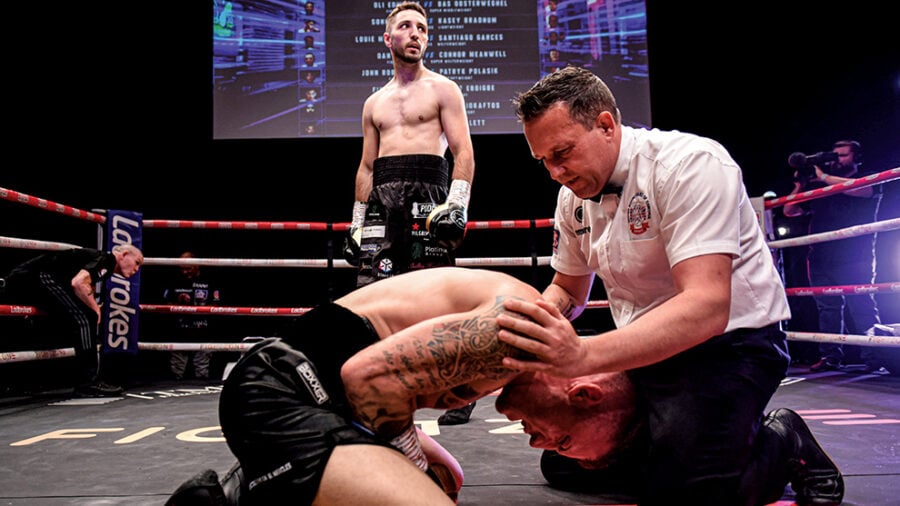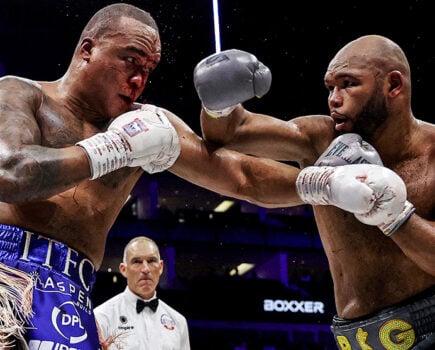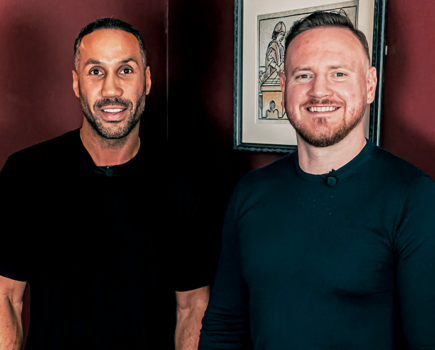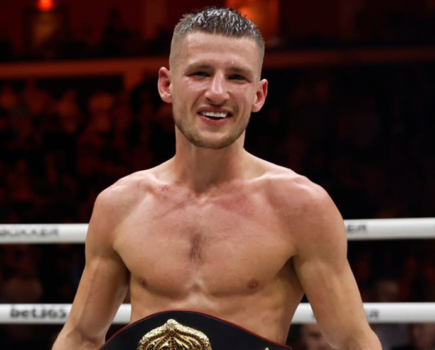ALTHOUGH it is often said that the key to finding success in any field boils down to a willingness to do the hard work in silence, it is easier to say that of some professions than it is others.
In boxing, for example, it is all well and good training alone for years and honing your craft, but at some point there will need to be a crowd, if only to justify risking your life in pursuit of success in a sport known to harm as many as it helps. Without this crowd, choosing to be a professional boxer becomes, at best, a dangerous and misguided hobby, and, at worst, something closer to masochism.
It certainly makes no sense to continue hurting people and getting hurt if the doing of these acts brings you no financial reward. This is not, after all, a game you play for fun or to pass the time. In fact, to fight in silence, or an empty room, is as futile an exercise as you can possibly imagine.
Most boxers on the small-hall circuit will soon become aware of this, of course. It’s why in fact many of them give it a go at first and decide in the process whether they are (a) good enough to become prospects capable of attracting the attention of major promoters or (b) prepared to make a decent but, more importantly, consistent wage as journeymen in the away corner. These two options, for a small-hall boxer, are really the only ones in this day and age, for anything in between represents a danger; a risk likely to backfire and bring the boxer none of the rewards they hoped for and presumably need.
Some learn this the hard way; that is, when it is too late. Others, however, like welterweight Dan Morley, realise early on that boxing is about more than just turning up and punching and therefore create the foundation to maximise all possibilities.
Now 9-0 as a pro, Morley will be the first to admit his career has been one of the stop-start variety. Impacted as much by his own meandering as the Covid-19 pandemic, Morley has so far stuttered his way through life as a pro, fighting no more than three times a year (in 2018) and recently taking a two-year break from the sport.
“I never intended to fully walk away,” he said of that time in the wilderness. “I was towards the end of my tether, patience-wise. Something needed to change and I needed to take a step back. When I took that step back, the idea was to just have a six-month break. That ended up being a year or a year and a half before I then started getting the idea of coming back.
“I had just beaten (Louis) Isaacs in a really good fight (in 2021) and I was really expected to push on after that. But my career was going on during a really funny time. I had six fights before Covid, all within the space of 18 months, and then I had two years off because of Covid. I boxed Isaacs, broke my hand, which slowed things down, and before boxing Isaacs I had some big promoters offering me sit-down meetings. Once I got that fight out of the way, it felt like it was going to happen for me. I eventually got a contract offer but would have to wait another six months to fight. That was supposed to be a three-fight deal but the fella who offered me that deal left the company and again I got dropped. I boxed on a show for 500 pounds and never heard from them again.
“I couldn’t earn the money I wanted, I started getting injured – nose breaks and hand breaks – and I basically just needed a proper break from it.”
Like so many, Morley was learning the hard way. He was learning that to have any chance whatsoever in the sport you have to train like a champion despite not earning a champion’s money, boasting a champion’s profile, or receiving the kind of opportunities a champion can expect to receive. This is usually enough to break any fledgling boxer’s spirit.
“Before I was so burnt out,” he admitted. “I was sparring with the likes of Josh Kelly, Harlem Eubank, Mick Conlan, Abass Baraou, and doing that every week. I did that for two years and my life was just boxing, boxing, boxing. I was running up hills every weekend with them. It was all great experience but to do that and earn no money is tough. I started to hate boxing.
“I promised myself when I came back that I wouldn’t get myself into that position again. If I have to do it, I’ll do it for eight-week spells and I’ll stay in the gym in between, but I’m going to have a balance. If I want to go away and enjoy my life, I will do that for a few weeks as well. When I was in that phase, my outlook was basically this: how quickly can I get through the next six or seven years and just get this done? That’s not a healthy place to be.
“I’m not getting any fights, I’m always getting let down by promoters, and it felt like Groundhog Day for me. The other guys in the gym would train like that and then have a big fight at the end of it, and win a title, and earn big money. But it wasn’t like that for me. I never had the payoff or the break.”
Morley, 27, won’t be a name familiar to many in boxing circles, yet online – particularly on Instagram and TikTok – he has, during his time away, generated quite the following (212,000 followers on Instagram; 199,000 followers and 6.3 million likes on TikTok). Considering an online presence to be essential if he wanted to return to and succeed in the ring, Morley, during his two-year hiatus, effectively embarked on a mission to increase his followers, and therefore his profile, before returning to boxing last Saturday (July 6). He did so not by stripping off for OnlyFans, flogging CBD oil, or spreading conspiracy theories, but instead in a way that can be deemed in 2024 somewhat old-school, novel, refreshing.
“If I was going to come back to boxing, I couldn’t do it the way I had been doing it,” he explained. “I had a few sponsors, but it was basically just working off nothing and hoping a big opportunity comes along. I just couldn’t do it like that. I had no money at all.
“So, I started working in a few gyms, started doing the personal training, and I really started making the boxing videos on social media. The idea was to get that to a place where I would start getting a following and getting opportunities off the back of it; punditry or whatever else. I started meticulously doing those videos. I wasn’t earning money from them, but I’d clip the footage, put the footage together, and do the voiceover. I’d do four videos a day and that would take four or five hours a day. The idea was to get a following and then have people a bit more interested in me when I decided to come back.
“When I started my accounts on TikTok and Instagram, I followed a couple of hundred boxing pages but didn’t know how to build a social media following. My barber basically told me that I should make a TikTok about boxing but that didn’t really get any traction. It was just me posting boxing videos of myself. Then I started making boxing videos about styles, and other fighters and eras, and on TikTok it kind of easily blows up if you get something that catches on. I did a Cuban style video and it got three quarters of a million views and then the one about the Soviet style reached a million views. With the constant pushing of it, you’re just appearing more and more on the algorithm and it kind of has a domino effect.”
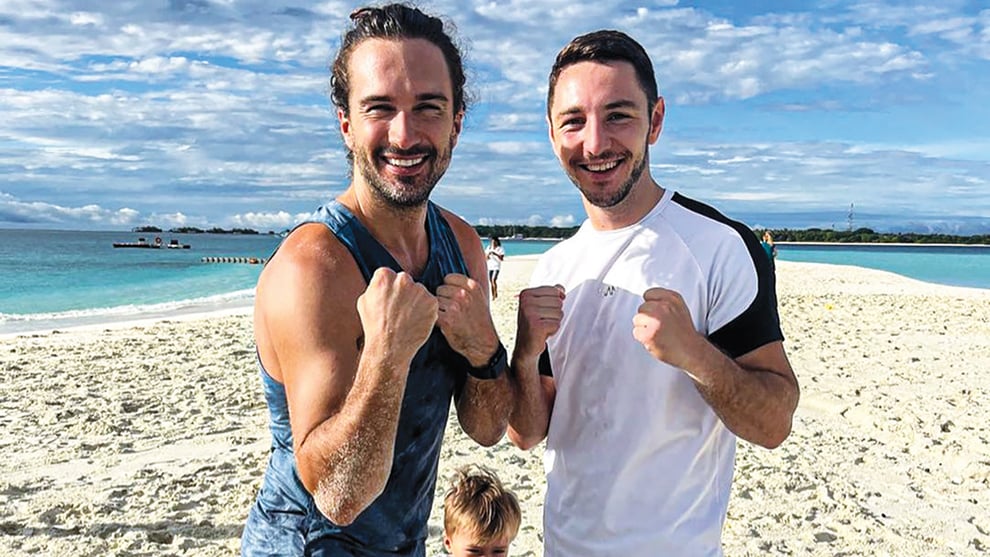
Dan Morley with Joe Wicks
In addition to the social media push, Morley diversified his talents by exploring lucrative opportunities in the world of personal training. This had him working in places like the Maldives and Switzerland and rubbing shoulders with the likes of Millie Bobby Brown of Stranger Things fame, fitness coach Joe Wicks, and rugby player Jason Robinson. Doors, naturally, soon started to open for Morley and it was no surprise that when he announced his “return” to the ring the interest in this fight – a six-rounder against 2-9 journeyman Connor Meanwell at Indigo at The O2 – was considerably greater than it had been for any of his previous fights.
“The response has been unbelievable,” said Morley, who stopped Meanwell with a body shot inside the first round. “It was a good journeyman opponent, but it was only a journeyman with a 2-9 record. When I boxed Isaacs that was one of the best fights of that year, but people don’t know about it. I didn’t earn any money from it. People thought I was making my debut the other day, yet I have already got a ‘Fight of the Year’ contender in the bank. That just goes to show it is all about how you market yourself and get yourself out there. That 45 seconds is the most-watched I have ever been. I’ve had 13 years in this sport and people think I’m just getting started.”
Now, with stronger foundations and a platform he can use to sell himself, Morley is thinking about his career as a pro boxer in different terms these days. He sees greater opportunities, both financially and so far as titles, and knows that soon it will be on him to prove he is good enough. Which, for any boxer, is perhaps the ultimate dream: to know that true success has not a thing to do with marketability or self-promotion but instead in the end boils down to whether you are any good or not.
“I have sparred with some very good fighters and I have always been able to hold my own or even do more than that,” Morley said. “I know how good I am. People always say to me, ‘You’ve got no confidence,’ just because of the way I am. But I look at all those old fighters I do videos about and I look at their careers and I just want something like that for myself. I want to have a load of fights, a load of good ones, and win titles. If I’m to make some goals, next year winning an English title would be good, and I’d like to win the British and European titles after that. I’m in one of the most stacked divisions in the world, so if I got a crack at (Jaron) Ennis or (Terence) Crawford in the future I’d definitely take it. So long as I can just keep active, and keep challenging myself, titles will come from that.”
Regardless of what happens in the future, Dan Morley knows now that he will be followed wherever he goes.

